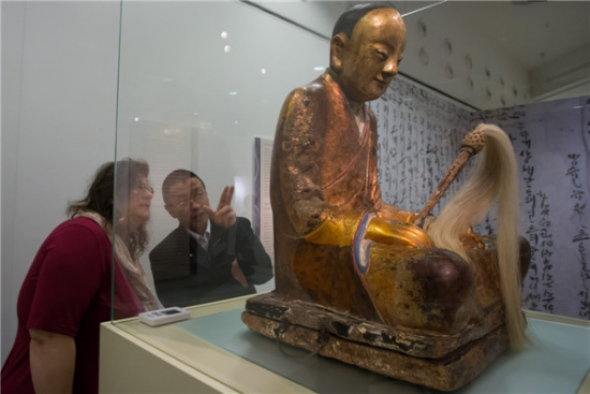
The Buddha statue on display at the Hungarian Natural History Museum in Budapest in March. (Photo/Xinhua)
Conditions set by a Dutch collector for the return of a mummified buddha believed stolen from an east China village in 1995 have been rejected by the villagers and a top legal academic.
"After the conditions were disclosed by media, we discussed the issue, and found two of the three hard to accept," said Lin Wenqing from Yangchun Village of Fujian Province's Datian County.
The Dutch collector had told Xinhua, "Firstly, I want it to go to a big temple instead of the small village temple. Secondly, I want to do some scientific research for which I hope to get some cooperation."
"Thirdly, I just want them to pay a reasonable amount of money, as is normal," he said, speaking on condition of anonymity. "It will become part of a bigger collection of art, which was already for sale and to which I have added this statue. So now it is only for sale as part of this collection."
The Dutchman, an architect in Amsterdam, has been quoted as saying he wants to give the mummy, known as "the Zhanggong Zushi," to the large and celebrated South Putuo Temple on Xiamen Island in Fujian.
"The Zhanggong Zushi was worshipped as a god in our village for more than 1,000 years," Lin said. "We could not accept placing it elsewhere."
As for the payment, Lin said the demand itself was understandable but the villagers could not afford the amount bandied about by the collector.
He said he bought the mummy for 40,000 Dutch guilders (about 19,848 U.S. dollars) in the 1990s, and that he has been offered 20 to 30 million U.S. dollars for it.
Huo Zhengxin, deputy director of the School of International Law with China University of Political Science and Law, told Xinhua preliminary investigation has suggested the mummy was stolen from Yangchun.
"It is not reasonable to give it to another temple," he said.
Concerning the collector's wish for research, Huo believes China would cooperate.
But the academic said China "will not, and should not" accept his requirement to buy it as part of a bigger collection.
"We could give him compensation covering the price he paid for the mummy, and costs for protection, repair, consignment and insurance," Huo said.
According to sources with the Chinese State Administration of Cultural Heritage, administrators of South Putuo Temple have told them they "have never worshiped any mummified buddha and have no intention to enshrine and worship the Zhanggong Zushi."
Zhanggong Zushi was a local man who became a monk in his 20s and won fame for helping people treat disease and spreading Buddhist belief.
When he died at the age of 37, his body was mummified and encased during the Song Dynasty (960-1279) in the statue in which it remains.
The statue was displayed in a "Mummy World" exhibition which opened in October last year in the Hungarian Natural History Museum. It was scheduled to be on show until May 17, but was pulled from the exhibition following allegations it was stolen.
In his interview with Xinhua, the Dutch collector questioned whether the mummy was the same one lost from Yangchun, citing differences between the left hand and head and their description in Chinese accounts.
Huo told Xinhua that more research is needed to establish which side is right. "The Yangchun villagers have commissioned lawyers to investigate," he said. "We have the report received by police in 1995 when the statue was found to be missing."
Lin Wenqing remembered that a wedding was held that day: "We couldn't get the date wrong."
The Dutch collector claims he obtained the mummy in 1996.
Hundreds of residents of Datian County signed a letter to Dutch Prime Minister Mark Rutte in March, pleading for the return of the buddha. The letter was handed to European-Chinese groups in the Netherlands, which delivered it via the Chinese embassy.
The villagers have also signed an agreement with lawyers to bring the case to Dutch court.


















































